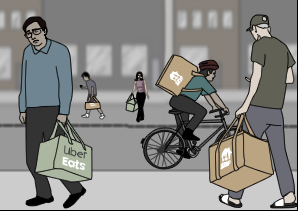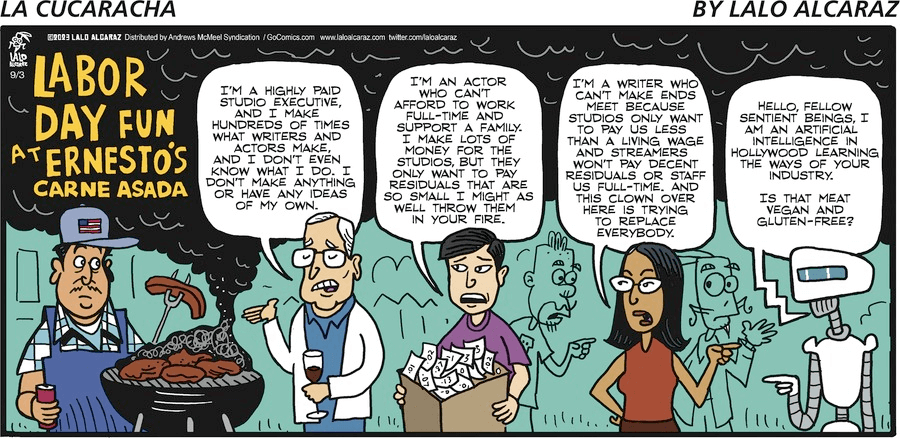I wish I could believe in Paul Fell’s vision of a world in which labor unions had the upper hand on management. He’s got a point in that the falling unemployment rate gives workers a degree of leverage they haven’t enjoyed in quite a while, and it’s also true that there has been a jump in unionization efforts in some previously lowly places, like coffee shops and Amazon warehouses.
And the guilds have brought Hollywood to its knees, and the solidarity there has been impressive, though it’s somewhat self-contained. That is, back when the people who make Pullman sleeping cars went on strike in 1894, rail unions refused to work trains that carried the sleeper cars and a shut down of rail traffic threatened to bring American industry and the mails to a grinding halt.
Lalo Alcaraz (AMS) has some contact and experience in that part of the world, and Sunday’s La Cucaracha (AMS) was sympathetic to their situation. However, and wit’ all doo respeck, I don’t think suspending production of Freaky Friday II threatens the nation’s stability, nor have I seen TV screens going blank because IBEW workers refuse to cross the picket lines.
By contrast, the federal government stepped in with an injunction and military troops to end the Pullman strike, though Grover Cleveland more-or-less simultaneously instituted Labor Day as a salute to the workers.
Which I suppose is better than in the UK, where someone described a bayonet as a weapon with a British workingman on each end.
We aren’t nearly at that point today, the largest impact to the labor shortage seeming rather to be that burger flippers are earning considerably more and that, as a result, we’re paying more for a burger-fries-soda fast-food meal than we did two years ago.
That’s solidarity, so long as you don’t complain about the price increases.
As the song asks, “Which side are you on?”
Joy of Tech makes the point that, while a falling unemployment rate has always included the factor of people giving up seeking work, we’ve found a sort of hybrid situation in which people are taking jobs that aren’t really jobs, at least not jobs that would have satisfied Eugene Debs or Samuel Gompers.
Back in the 1890s, we had people doing piecework in their tenement hovels, making clothes or rolling cigars, with the children helping and only the most dedicated and industrious making more than enough to barely scrape by.
The burgeoning middle class wore the finery thus produced and declared that what we needed was a good five cent cigar, which seems a lot like Charles Dickens having his burger and fries delivered to his door by Tiny Tim.
By contrast, the American worker is being told by Steve Breen (Creators) and others how bad she’s got it, though we still live high on the hog compared to other countries, including some developed nations where gas prices are higher and groceries no more affordable.
Inflation is down but that doesn’t make the bills easy to pay, and it takes some skill to find recipes that match a tight budget, especially while living in a nation where good public transportation is largely found in places where major grocery stores are not.
And, again, if you want workers paid more, you’ll have to shoulder some of the resulting burden.
Meanwhile, those complaining most about Bidenomics offer little for workers beyond slogans and empty promises. Bill Day penned this cartoon in 2006, following yet another mining disaster caused by cutting corners and violating safety rules.
A decade later, Hillary Clinton campaigned on a promise to help people in Coal Country train for alternative, sustainable jobs, but lost to a rival who, instead, promised to increase use of coal and employment in the industry.
And they’re poised to vote for him again.
That’s hardly the only sector in which jobs are threatened, and Clay Bennett (CTFP) is one of several cartoonist noting the potential for artificial intelligence to take jobs.
It’s not the first time, of course. Low-skill jobs have been threatened by innovative technology since the dawn of the Industrial Revolution and what has changed has mostly been the definition of low skills, since each new technology seems to nibble a bit higher on that scale.
Michael Ramirez (Creators) suggests some irony in having AI replace a clerk at the unemployment office, but that’s hardly the only place it’s likely to result in fewer people handling mundane tasks. A lot of the people who actually count the beans and send out the notices are likely to find themselves delivering burgers and fries to Charles Dickens.
In Dickens’ time, there were people sitting on stools copying out rows of numbers and adding them up by hand, which is how Bob Crachitt and young Philip Pirrup, among others, found employment. Typewriters and adding machines and spreadsheets decimated the ranks of the clerks and secretarial staff.
This is just another series of similar cuts.
If there is a need for governmental control of this breakthrough technology, I fear Jeff Danziger (Counterpoint) is right in assuming that the regulators will remain as ignorant of it as they have so far remained ignorant about Intertubes and other magickal wonders.
Lest we forget, here’s Sen. Ted Stevens immortal 2006 explanation of how it all works:
But if we’re going to laugh at Congress for not knowing how things work, we should do a little self-education ourselves. This Grand Avenue (AMS) repeats an oft-heard complaint about self-checking stations in stores which misses a major point in why automation replaces low-skilled workers.
Stores have been enlisting help from customers for the better part of a century, having them select products from the shelf instead of having “shop girls” fetch each item, and having them bring their items to the check-out counter and schlep them out to their cars.
Both banks and gas stations have done much the same with ATMs and self-serve pumps.
Granted, supermarkets make a profit, but whether automation increases that or — particularly with unemployment at 3.8 percent — simply allows it to remain steady is a job for a CPA.
If you insist, one on a high stool, with a ledger and a quill pen.












Whenever I hear someone going on an anti-union rant, I ask them what they’re doing this weekend.
My local newspaper editor spent 800 words this weekend honoring workers in his Labor Day column, the word “union” was not included.
This is an Excellent explanation of what unions did for ‘them’.
Dear Mike, I know it is slightly off topic, but I think you will agree with this comic:
https://www.gocomics.com/pricklycity/2023/09/03
Good point -but he seems to feature some “zombie” strips, which are said to block new talent…
Wonderful video. Thanks for sharing. On my brief Facebook post today I remind folks of 40-hour work weeks, paid vacation, child labor laws, and health benefits.
I find it hard to be terrified by AI. Like it or not, it will become the new normal.
After all, the days where gas attendants would pump your gas and clean your windows and do basic checks while the driver never once had to leave their cars are long-gone.
The days where there’d be someone who’s “job” it is to stand inside an elevator all day and press the little buttons for you are long-gone.
The days where you’d have to go down to the ferrier to get new shoes for your horse so you could ride to your workplace are long gone.
Jobs come and go, new technology is invented all the time that makes old jobs obsolete. We can either wring our hands and scream bloody murder, or we can find ways to adapt and create new jobs.
Personally, I think that slowly but surely we’re headed for a “Wall-E” society where nobody has to work anymore, and everything it automated.